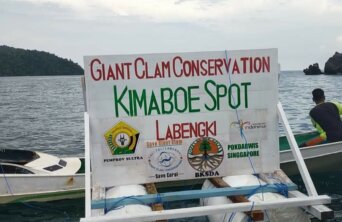- About
- Topics
- Picks
- Audio
- Story
- In-Depth
- Opinion
- News
- Donate
-
Signup for our newsletterOur Editors' Best Picks.Send
Read, Debate: Engage.

| topic: | Ocean Pollution |
|---|---|
| located: | Indonesia |
| editor: | Leo Galuh |
A group of volunteers led by Habib Nadjar Buduha in Indonesia's Labengki Island, Southeast Sulawesi Province, recently discovered a new threat to the marine environment. The coral reefs, home to giant sea clams (Tridacna gigas), have been destroyed by nickel ore waste.
Nadjar's grassroots movement to save clams and coral, which began in 2009, must now clean and dispose of the thickening 4 centimetres of nickel ore waste in coral reefs. Otherwise, all marine life, including in the Bajau fishermen's region from nearby Labengki Island, will perish.
Giant sea clams, the world's largest marine bivalve molluscs, play an essential role as a natural seawater filter. Plankton and its waste are the primary sources of nutrition for Giant sea clams, which they absorb from seawater. The absorbed seawater is then released in a clean state. This process plays a crucial role in maintaining the cleanliness of the sea, which is vital for the health of coral reefs.
The Bajau people's island has not been affected by mining activities. However, Labengki Island is situated directly across the nickel mining area of North Konawe Regency in Southeast Sulawesi province. According to the Southeast Sulawesi Statistics Agency, around 50 nickel mining companies operate in this region.
Indonesia is crucial in accelerating the global transition to clean energy by supplying raw nickel to power electric vehicles. It has approximately 21 million tonnes of nickel reserves, as much as Australia, according to the United States Geological Survey, and has partnered with the Chinese government under the Belt and Road Initiative (BRI) to be a global nickel supplier and meet market demands.
Indonesia and China account for 70% of global nickel supply and demand, influencing the global outlook for nickel. Indonesia aims to leverage its nickel resources, while China possesses the technology and skilled workforce for ore processing.
However, due to nickel waste, the mineral industry in Indonesia is causing pollution, particularly in Southeast Sulawesi, Central Sulawesi and North Maluku. The nickel industry harms the air, sea, and workers' welfare. It is the unspoken cost of the world's energy transition.
In October, China President Xi Jinping remarked at the Third Belt and Road Forum that the country will promote green development. China is committed to deepening cooperation in green infrastructure, energy, and transportation.
This is a good gesture by the Chinese government to fix their foreign investment abroad under BRI, specifically in critical minerals. Yet, still, it is not enough for the suffering people in remote areas like Labengki Island. The Chinese government should encourage their Chinese firms to adhere to the highest Environmental, Social, and Governance (ESG) standards so that their operations do not harm the host country.
It is unjust that individuals who coexist peacefully with their natural surroundings are forced to bear the brunt of the energy transition. In remote parts of Indonesia, people are grappling with the aftermath of underwater pollution caused by nickel mining corporations that benefit from the commodity. These corporations are responsible for the pollution, and the residents struggle to clean up their environment.
Image by Habib Nadjar Buduha, founder of the Kima Toli Toli-Labengki Conservation Team.
